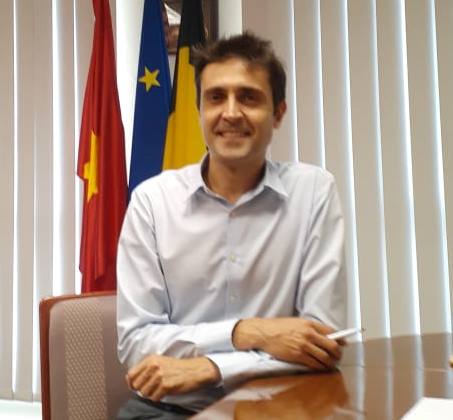Academic cooperation model contributes useful expertise to MDR’s climate change response
VGP – Policy makers and local authorities should take up effective results of academic cooperation from joint researches of Vietnamese and foreign universities and academies in mitigation of climate change in the Mekong Delta Region (MDR), said Mr. Ivo Hooghe, First Secretary in charge of development cooperation, Embassy of Belgium in Viet Nam.
|
|
|
Mr. Ivo Hooghe, First Secretary in charge of development cooperation, Embassy of Belgium in Viet Nam |
Belgium and Viet Nam, which have been developing the bilateral relations since 1973, are now aiming to foster the solid relationship that has already born multiple partnerships in trade, investment, and academics, said Mr. Ivo Hooghe.
The bilateral development assistance program at governmental level was concluded in 2019 as Viet Nam attained the status of a lower-middle income country. However, Viet Nam remains a partner of Belgium in academic and scientific cooperation. Both countries are trying to reinforce the cooperation in trade and investment.
In the Mekong Delta Region, one of the regions most vulnerable to climate change, the model of academic cooperation has been deployed between Can Tho University (since 2016) and the Research Institute for Aquaculture No. 2 (since 2019) and Belgian counterparts. These projects targeted to back the MDR to effectively respond to climate change, reduce greenhouse gases, and develop sustainable aquaculture and agriculture.
Specifically, three Belgium-funded projects in the Mekong Delta Region are undergoing including (1) soil-improving cropping systems for sustainable rice production in the Vietnamese Mekong Delta (SUSRICE), (2) supporting the Mekong fish farmers with the breeding of tra catfish, (3) and towards a sustainable pangasius breeding (PRD – PANGAGEN).
So far, these projects got initially successful results, offering good experiences for local farmers in response to climate change, Mr. Ivo Hooghe announced.
According to the diplomat, there are a lot of academic cooperation programs in Viet Nam with useful and practical scientific expertise in mitigation of climate change. He suggested policy makers and local authorities select useful ones to apply knowledge and materialize researches in reality in the path to help the MDR adapt to climate change and reduce green-house gases.
Firstly, the SUSRICE project aims at increasing crop production by introducing soil-improving cropping systems, while reducing inputs like water and fertilizer, and greenhouse gas emissions. Cropping systems in which rice is rotated with upland crops within one year instead of rice monoculture with three rice crops per year, and amending soil with organic fertilizers.
The second program depends on established and successful quantitative genetic approaches to improve the quality of catfish production. The outcome should improve the resilience of the rural community and smalholder fish farmers in view of global change and improve the research capacity of the local scientists.
PRD – PANGAGEN, worth around € 500,000 of grant, aims at bringing new solutions to the threats the catfish aquaculture sector starts to face in the Mekong Delta due to the increasing salinization. It targets the generation of animals using a selection experiment and to organize the local sector to obtain an optimal diffusion of the experiment results, so that the research could be beneficial for all the actors of the chain, including the smallholders, who are the most threatened by the coming changes./.
By Thuy Dung - Kim Loan


